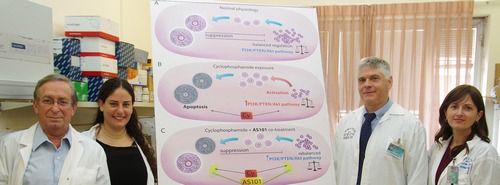Sheba scientists discover mechanism responsible for infertility caused by chemotherapy and potential method for preserving fertility using AS101
A new Israeli study published today in Science Translational Medicine (published by the American Association for the Advancement of Science), discovers the mechanism responsible for the destruction of eggs and infertility that occurs with chemotherapy treatments. The study furthermore shows that co-treatment with the immunomodulator AS101 during chemotherapy successfully prevented the damage to fertility.
The study was conducted by PhD student Lital Kalich-Philosoph and Dr. Hadassa Roness at the Center for Fertility Preservation at the Sheba Medical Center - Tel Hashomer Hospital in Israel, headed by Prof. Dror Meirow, in collaboration with the Cancer AIDS and Immunology Research Institute at Bar-Ilan University, headed by Prof. Benjamin Sredni.
Unfortunately, cancer treatments such as chemotherapy carry side effects can be felt for the rest of the patient's lifetime, such as ovarian damage and infertility, which is particularly problematic in young cancer patients who receive their treatments before they've had an opportunity to have children. Alkylating agents such as cyclophosphamide (Cy) carry a high risk of ovarian toxicity and are among the worst offenders with regard to risk of future infertility.
For years, medical research and treatment has been working to find ways to preserve fertility in female cancer patients. Methods such as freezing of eggs or embryos followed by IVF treatments, or freezing of ovarian tissue for transplantation after recovery are routinely practiced but are unsuitable for all patients, as well as being invasive and expensive, and carry no guarantee of success. A far better method of preserving fertility in cancer patients would be to prevent the damage and loss of eggs that occurs during chemotherapy.
To address this challenge, PhD student Lital Kalich-Philosoph and senior researcher Dr. Hadassa Roness used a mouse model of Cy treatment to demonstrate that this chemotherapy drug attacks the ovaries by a twofold mechanism. It is toxic to dividing cells and kills actively growing ovarian follicles. At the same time, it also activates the dormant follicles, inducing them to grow and proliferate, which makes them susceptible to the effects of the drug as well.
In this way, Cy treatment depletes the ovarian reserve, leading to early ovarian failure and infertility. Prof. Meirow explains. "The dormant oocytes are a woman's fertility reserve. Until now the loss of these oocytes was believed to be the direct result of the toxic effects of the chemotherapy, and research focused on ways to prevent the direct death of these cells. However, what we found is that the oocytes are not killed by the chemotherapy, rather it triggers a wave of growth in these dormant cells. Once they begin the process of growth and maturation, they ultimately die off, thus causing burnout of the ovarian reserve. This new understanding of the mechanism behind the loss of these cells has allowed us to shift the focus and find a new drug that can prevent the growth of the oocytes."
The authors tested the use of an experimental drug called AS101, which was found to block the activation and growth of the dormant oocytes. Mice treated with AS101 in conjunction with Cy fared much better than their counterparts receiving chemotherapy alone. Their primordial ovarian follicles remained dormant, did not start proliferating prematurely, and survived through the entire treatment. Subsequently, the mice that received AS101 along with Cy had normal fertility, whereas the ones treated with Cy alone had a lower rate of pregnancy and fewer total offspring.
"AS101 was developed at Bar-Ilan University," explains Prof. Sredni. "It is currently in advanced clinical trials for use in cancer patients, and previous studies have shown that it does not affect the efficacy of the chemotherapy treatment, and may even increase the effectiveness of treatment."
Future experiments will be needed to translate this work from mice into human patients and confirm the effectiveness of AS101 for preserving fertility in the clinical setting. The discovery regarding the mechanism behind Cy-induced loss of ovarian reserve is an important breakthrough that will pave the way for additional research into new methods for preserving fertility in cancer patients.
The entire study was carried out in Israel by Israeli researchers and was supported by grants from the Kahn Foundation, Israel Cancer Association, Israel Ministry of Health, Dave and Florence Muskovitz Chair in Cancer Research, and the Jaime Lusinchi Research Institute in Applied Sciences. The participants of these studies were awarded by a number of prestigious prizes.
Additional contributing authors include Dr. Alon Carmely, Dr. Michal Fishel-Bartal, Dr. Hagai Ligumsky, Dr. Shoshana Paglin, Prof. Ido Wolf, and Dr. Hannah Kanety - all of the Sheba Medical Center.

5 minute film








